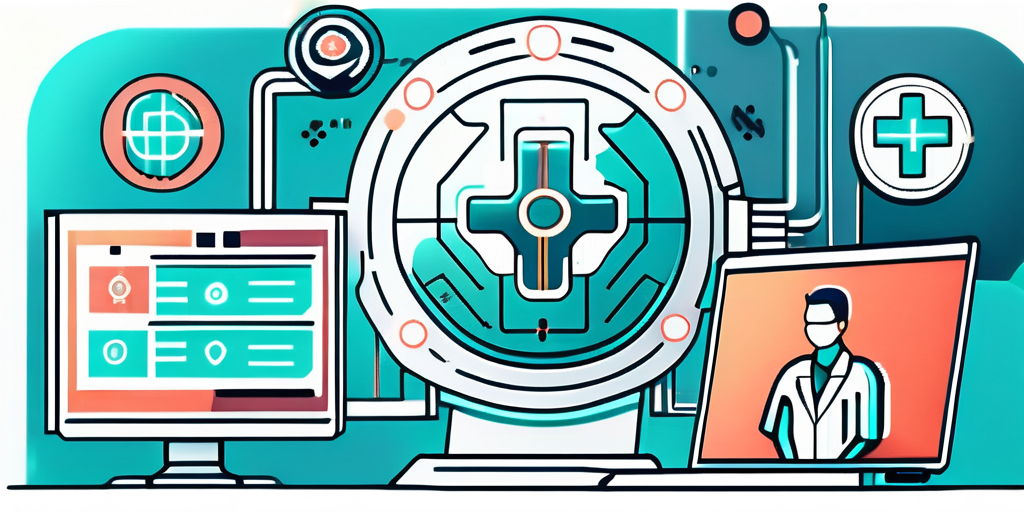In today’s modern era, the intersection of artificial intelligence (AI) and patient data protection has become a critical concern for healthcare providers. As AI technologies continue to advance and become more prevalent in clinical settings, it is essential to understand the role of AI in modern clinics and the importance of safeguarding patient data.
Understanding the Intersection of AI and Patient Data Protection
AI has emerged as a game-changer in the healthcare industry, enabling clinics to streamline processes, improve diagnostics, and enhance patient care. With the ability to analyze vast amounts of data and identify patterns, AI has the potential to revolutionize healthcare delivery. However, this technological advancement also brings forth challenges and risks, particularly in regards to patient data protection.
The Role of AI in Modern Clinics
AI is being used in various aspects of healthcare, including clinical decision support, imaging analysis, predictive analytics, and personalized medicine. It helps healthcare professionals make more accurate diagnoses, develop personalized treatment plans, and improve patient outcomes. The power of AI lies in its ability to process and analyze large datasets rapidly, detecting patterns and anomalies that may not be readily apparent to human clinicians.
The Importance of Patient Data Protection
Patient data protection is of paramount importance in modern clinics. As clinics increasingly rely on AI to process and store patient information, it is crucial to ensure that data privacy and security are upheld. Medical records contain highly sensitive information, including personal identifiers, medical history, and treatment details. Protecting this data is not only an ethical obligation but also a legal requirement.
Furthermore, the implementation of AI in healthcare raises concerns about data breaches and cyber threats. As patient data becomes more digitised and interconnected, the risk of unauthorised access and data leaks also increases. It is essential for healthcare providers to invest in robust cybersecurity measures and encryption protocols to safeguard patient information from malicious attacks.
Moreover, the ethical implications of AI in patient data protection cannot be overlooked. The use of AI algorithms to make critical healthcare decisions raises questions about transparency, accountability, and bias. Healthcare professionals and AI developers must work together to ensure that algorithms are fair, unbiased, and transparent in their decision-making processes. Ethical considerations should be at the forefront of AI implementation in healthcare to maintain patient trust and confidentiality.
The Potential Risks and Benefits of AI in Patient Data Protection
While AI brings immense benefits to healthcare, it also poses risks to patient data privacy and security. Striking the right balance between AI innovation and data privacy is crucial for maintaining patients’ trust and ensuring compliance with regulatory requirements.
Artificial Intelligence (AI) has revolutionised the healthcare industry, offering unprecedented opportunities for improving patient care, diagnosis accuracy, and treatment outcomes. However, with these advancements come significant challenges in protecting sensitive patient data from potential breaches and misuse.
Balancing AI Innovation with Data Privacy
As AI technologies evolve, it is important for clinics to stay updated on data protection regulations and best practices. Implementing robust security measures, such as encryption, access controls, and regular system audits, can help safeguard patient data. Additionally, clinics should adopt privacy-by-design principles, integrating data protection measures from the earliest stages of AI system development.
Furthermore, healthcare providers must consider the ethical implications of AI algorithms in decision-making processes. Ensuring transparency and accountability in AI systems is vital to building patient trust and maintaining the integrity of medical practices.
Mitigating Risks Associated with AI and Patient Data
While AI offers numerous benefits, it also introduces potential risks, such as data breaches, algorithmic biases, and the potential misuse of patient data. To mitigate these risks, clinics should implement comprehensive data governance frameworks that outline clear policies and procedures for data collection, storage, sharing, and anonymization. Regular staff training on data protection and privacy practices is also essential to ensure compliance.
Moreover, collaboration between healthcare organisations, regulatory bodies, and technology experts is crucial in developing industry-wide standards for AI implementation in patient data protection. By fostering a culture of continuous learning and improvement, the healthcare sector can harness the power of AI while safeguarding patient privacy and security.
Key Principles for Integrating AI and Patient Data Protection
Integrating AI and patient data protection requires a holistic approach grounded in transparency, patient consent, and respect for patient autonomy.
When it comes to the integration of artificial intelligence (AI) in healthcare settings, ensuring the protection of patient data is paramount. Transparency plays a crucial role in building trust between healthcare providers and patients. By openly communicating how AI technologies are utilised and how patient data is collected, stored, and analysed, clinics can foster a sense of trust and accountability. Patients have the right to understand how their data is being used and the potential implications of AI applications on their healthcare journey.
Ensuring Transparency in AI Applications
To build trust with patients, clinics must be transparent about the use of AI technologies and how patient data is collected, stored, and analysed. Clearly communicating the purpose and potential risks of AI applications helps patients make informed decisions and consent to their data being used.
Moreover, transparency also involves being open about the limitations of AI systems and the safeguards in place to protect patient confidentiality. By providing patients with a comprehensive overview of the AI processes in place, clinics can enhance transparency and alleviate concerns regarding data security and privacy.
Prioritizing Patient Consent and Autonomy
Respecting patient autonomy means obtaining informed consent for the collection, use, and storage of their data. Clinics should provide patients with detailed information on how AI algorithms work, how their data will be used, and the potential benefits and risks involved. By giving patients control over their data, clinics empower them to make choices that align with their values and preferences.
Furthermore, prioritising patient consent involves ongoing communication and education to ensure that patients are aware of any changes in how their data is being processed or shared. Empowering patients to exercise their autonomy in decision-making regarding their data not only upholds ethical standards but also strengthens the patient-provider relationship.
Developing a Robust Strategy for AI and Patient Data Protection
Creating an effective AI data protection strategy requires a multi-faceted approach that encompasses technology, policies, and ongoing monitoring and assessment.
As the healthcare industry continues to embrace artificial intelligence (AI) technologies to improve patient care and operational efficiency, the need for robust data protection measures becomes increasingly critical. Safeguarding patient data from cyber threats and ensuring compliance with data privacy regulations are paramount concerns for healthcare providers.
Steps to Creating an Effective AI Data Protection Strategy
1. Conduct a comprehensive risk assessment: Identify potential vulnerabilities and risks associated with AI implementation in your clinic. This assessment should include technical, operational, and legal considerations.
2. Implement robust technical safeguards: Implement state-of-the-art security measures, such as encryption, access controls, and intrusion detection systems, to protect patient data from unauthorized access or breaches.
Moreover, it is essential to establish clear policies and procedures governing data access, sharing, and storage to mitigate the risk of data breaches. Regular audits and penetration testing can help identify and address security gaps before they are exploited by malicious actors.
Maintaining and Updating Your Strategy Over Time
The landscape of AI and data protection is constantly evolving. Consequently, clinics must regularly review and update their AI data protection strategies to stay ahead of emerging risks and technological advancements. Ongoing monitoring and assessment of AI systems, coupled with staff training, are crucial to ensure the continued effectiveness of the strategy.
Furthermore, fostering a culture of data security awareness among healthcare staff is essential in mitigating internal threats and ensuring compliance with data protection protocols. Continuous education and training programmes can empower employees to recognise and respond to potential security incidents promptly.
The Future of AI and Patient Data Protection in Modern Clinics
The potential of AI in patient data protection is vast, and the future promises exciting advancements and challenges. With the rapid development of artificial intelligence, we can expect to see significant improvements in the way patient data is protected and secured in modern clinics.
Predicted Advancements in AI and Data Protection
As AI technologies continue to mature, we can expect more sophisticated algorithms for data anonymization and de-identification, enhancing patient privacy. These advanced algorithms will play a crucial role in ensuring that patient data remains secure and confidential, even as AI systems become more prevalent in healthcare settings.
Furthermore, AI-driven cybersecurity solutions will help clinics proactively detect and mitigate potential threats, protecting patient data from unauthorized access. These solutions will constantly monitor the network infrastructure, identifying any suspicious activities and taking immediate action to prevent data breaches. This proactive approach will significantly enhance the overall security of patient data in modern clinics.
Preparing Your Clinic for Future Developments
To stay ahead of the curve, clinics should establish collaborations with digital marketing agencies focused on healthcare marketing. These agencies can help clinics navigate the complex landscape of AI and patient data protection, ensuring compliance with regulations and leveraging AI technologies in a secure and ethical manner.
Moreover, it is essential for clinics to invest in robust training programs for their staff to ensure they have the necessary skills to handle AI systems and patient data securely. By providing comprehensive training, clinics can empower their employees to effectively utilize AI technologies while maintaining the highest standards of patient data protection.
By working together, clinics can maximize the benefits of AI while safeguarding patient data. This collaborative approach will not only ensure compliance with data protection regulations but also foster a culture of trust and transparency between healthcare providers and patients.
In conclusion, AI holds tremendous potential for revolutionizing patient care in modern clinics. However, responsible integration and protection of patient data are paramount. By following key principles, developing robust strategies, and collaborating with experts in the field, clinics can harness the power of AI while upholding patient data protection standards. Together, we can navigate the ever-evolving landscape of AI in healthcare and ensure a secure and prosperous future.
As we embrace the transformative power of AI in healthcare, the journey towards excellence in patient data protection begins with a single step. I am Angelo Rosati, CEO of Clinic Marketing AI, and my team is dedicated to navigating this journey with you. With a legacy rooted in health tech and a commitment to excellence, we stand ready to be your partner in growth. Don’t let the complexities of AI and patient data protection be a barrier to your clinic’s advancement. Book a Call with Us today, and together, we will transform the future of Your Clinic.




